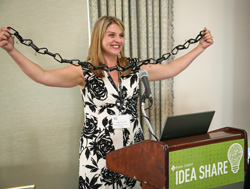 Here’s the “Meet the New Media” panel at the 2013 Farm Credit Idea Share. More on that in a moment.
Here’s the “Meet the New Media” panel at the 2013 Farm Credit Idea Share. More on that in a moment.
But first, to learn more about Idea Share, I spoke with Leigh Picchetti, Senior VP, Communications, Farm Credit Reputation Management Program. She says, “Idea Share is an annual meeting for Farm Credit System employees who have a responsibility within their Farm Credit organization for marketing, communications, public relations, sponsorship and giving and a variety of different reputation management activities.”
 I asked her what reputation management means to Farm Credit and she says, “We can’t take for granted the perception of the publics that we serve and the borrower/owners who are at our foundation.” Leigh says they know that they need to earn and keep the trust of those borrowers and owners as well as members of Congress who are their sponsors and the investors who make it possible to raise the capital to serve their customers and owners.
I asked her what reputation management means to Farm Credit and she says, “We can’t take for granted the perception of the publics that we serve and the borrower/owners who are at our foundation.” Leigh says they know that they need to earn and keep the trust of those borrowers and owners as well as members of Congress who are their sponsors and the investors who make it possible to raise the capital to serve their customers and owners.
Listen to my interview with Leigh here: Interview with Leigh Picchetti
Now back to the panel. We had an interesting mix with KayDee Gilkey, Northwest Ag Information Network; Dan Looker, Successful Farming; Emily Zweber, AgChat Foundation and myself and moderated by Becca Yaklich, AgriBank. Thanks to James Shaw for photos.
Our panel provided a mix of perspectives on the media landscape of today and how that impacts Farm Credit and the communications professionals attending Idea Share. You can find a number of ideas in the conference tweet stream and here are my notes for my opening remarks.
New media today is not so new. My Macbook Pro has more transmitting power in it than the radio station with a tower that I used to be a part owner in. And with this box I also have an international audience. This has been the case for going on 8 years now!
How does today’s landscape impact story development?
We live in such a culture of political correctness that is so extreme I think it has a real impact on what you’re seeing journalists write about and the words they use. People, including journalists, are losing their jobs for using words that some person or group somewhere get offended at. Companies are afraid of them.
We also have so many channels of information today that editors are having a challenge deciding what story to do and what story to post where.
We are also seeing journalists become much more opinionated in their reporting, more than I’ve ever seen. I think social media channels have fueled this trend. Just look at all the mainstream media like CNN, Fox News and even local newspapers who are very focused on what people have tweeted or posted to Facebook.
How do you use social media?
I use it as a resource to find story ideas. I also use it as a mechanism to share what I’m working on with my audience and point them to my online publications.
How do you like to work with PR professionals?
I like to develop a relationship with PR professionals so that they know what I want and need. And also so I know who to contact when I need information.
I would like releases to contain something at least close to news. Your latest donation to a worthy cause really doesn’t qualify as that.
If I’ve never met you or talked with you it’s not going to help you to send me a chatty email as if we’re best friends.
What can Farm Credit System Communicators do to help tell their organization’s stories?
Some media types might not agree with this but . . . With today’s communications tools I’d suggest using them to tell your own story.
No need to rely on someone else to do it for you. This means making a commitment to posting frequently and regularly on your blog or social networks and engaging with your own audience. Don’t view Twitter/FB as just another place to post your news releases.
